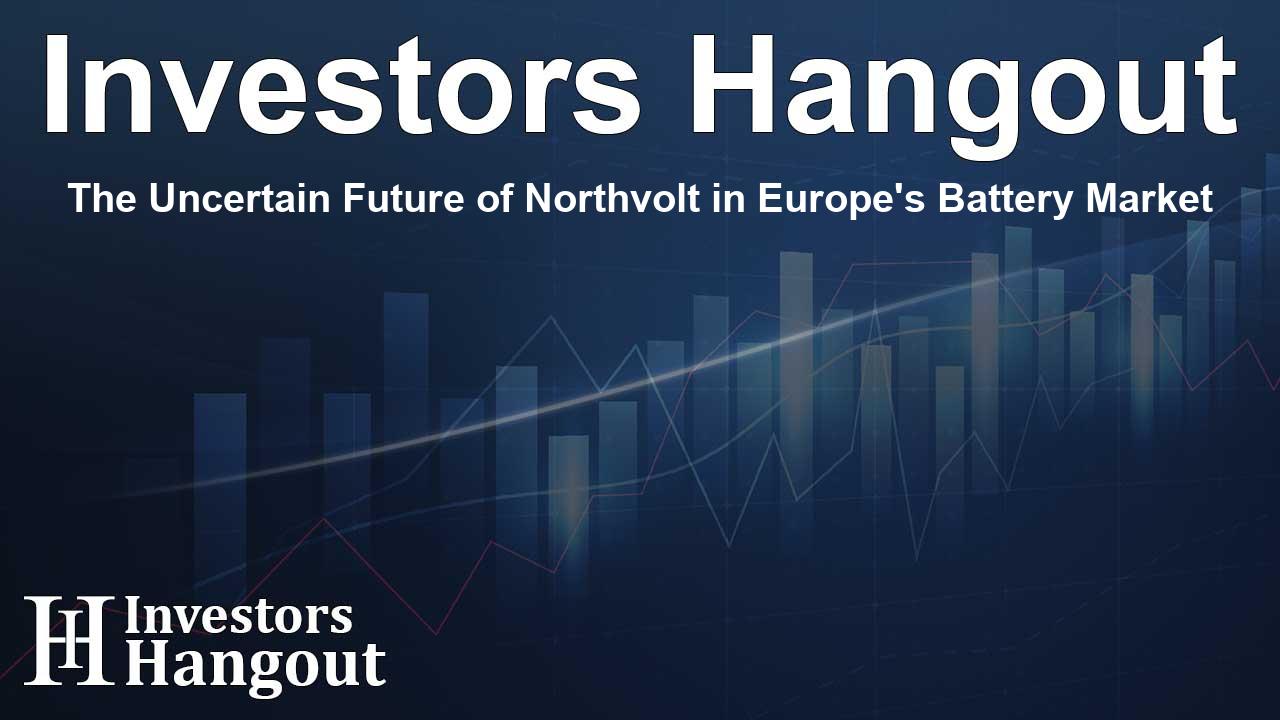The Uncertain Future of Northvolt in Europe's Battery Market

Northvolt's Challenges Impacting Europe's Battery Landscape
By Marie Mannes
Northvolt's recent decision to cut jobs and scale back operations has sparked deep concerns regarding the future of battery production across Europe. Founded in 2016, Northvolt was once heralded as a promising force in building a strong electric vehicle battery manufacturing sector. However, as industry analysts suggest, the current troubles faced by Northvolt may seriously undermine this vision.
Job Cuts and Operational Hurdles
The company is currently dealing with substantial operational challenges, including delays in orders and the unexpected termination of a significant $2 billion contract with a major automaker. Peter Carlsson, Northvolt's CEO and a former Tesla executive, has indicated a shift in the company’s focus. They've chosen to concentrate on battery cell production, which means halting the manufacturing of cathode active material (CAM)—a key element in battery technology.
This change indicates that Northvolt is stepping back from its broader ambition of being a comprehensive battery solutions provider. It also reflects a reduction in its capacity to manufacture critical components. The ongoing manufacturing issues have raised red flags, as Europe’s aspirations for independence in battery production face fierce competition from Asian manufacturers.
Impact of International Competition
Industry analysts warn that Northvolt's recent issues could put Europe in a more precarious position regarding local production of essential battery components. With powerhouses like CATL and BYD continuing to thrive, Northvolt’s setbacks might lead Europe to rely more on imports, a trend that threatens the continent’s future production capabilities.
Benchmark Mineral Intelligence has pointed out that without the ability to produce cathode active materials locally, Europe’s goals for sustainable electric mobility will be increasingly difficult to achieve. Moreover, Northvolt's problems have pushed them to seek foreign suppliers for these vital materials, further deepening Europe’s dependence on Asian industries.
Consequences of Canceled Contracts
The cancellation of key contracts from prominent clients highlights the distress within Northvolt. Despite having secured over $50 billion in orders from various stakeholders, including major investments from Volkswagen, Northvolt still operates at a loss. The loss of BMW's order is especially significant; production delays have left Northvolt lagging behind, raising doubts among clients about their supplier's reliability.
The company's production difficulties were further compounded when reports confirmed that Northvolt had fallen two years behind on its obligations to BMW, rendering previously agreed-upon deliveries obsolete. Similar issues were seen with Scania, a subsidiary of Volkswagen, indicating that Northvolt’s operational troubles have widespread implications across the industry.
Looking Ahead: Expectations and Developments
As we look to the future, Northvolt's outlook appears uncertain. Their Skelleftea factory in Sweden, a central part of their production strategy, has yet to reach its intended operational capacity. Originally aiming for an ambitious annual output of 60 gigawatt hours (GWh) by 2023, recent estimates now suggest a three-year delay, leaving analysts to wonder about the timeline for effectively deploying this capacity.
Additionally, the future of three proposed gigafactories is also unclear, as Northvolt navigates these immediate challenges. It seems that potential partnerships in recycling and lithium conversion might also be jeopardized as the company reevaluates its strategic direction in light of these setbacks.
Industry Response and Outlook
Despite facing significant hurdles, Northvolt still has some advantages over its competitors in the European battery market. However, there’s a palpable unease among potential customers who are closely observing developments. Feedback from industry peers reveals an increasing concern about Northvolt’s viability as a competitive player in the battery sector.
As Northvolt examines its strategy this autumn, the industry is watching with interest. The success or failure of this company could have lasting effects on Europe’s ambitions for local battery production.
Frequently Asked Questions
What prompted Northvolt to downsize operations?
Northvolt faced substantial manufacturing obstacles and contract cancellations, including a notable loss of a $2 billion order from BMW, leading to their decision to downsize.
What are cathode active materials?
Cathode active materials are vital components in battery cells that enable energy storage and release, essential for the operation of electric vehicles.
How has Northvolt’s situation affected the European battery market?
Northvolt’s challenges have raised concerns about increased reliance on Asian suppliers and hindered Europe’s efforts to create a self-sufficient battery production ecosystem.
Where does Northvolt plan to focus its efforts now?
The company is shifting its focus to producing battery cells rather than maintaining its previous role as a comprehensive battery material and production provider.
What is the current status of Northvolt’s factories?
Northvolt's Skelleftea factory is not yet operating at full capacity, with significant delays affecting its initial production goals and raising questions about future expansion efforts.
About The Author
Contact Riley Hayes privately here. Or send an email with ATTN: Riley Hayes as the subject to contact@investorshangout.com.
About Investors Hangout
Investors Hangout is a leading online stock forum for financial discussion and learning, offering a wide range of free tools and resources. It draws in traders of all levels, who exchange market knowledge, investigate trading tactics, and keep an eye on industry developments in real time. Featuring financial articles, stock message boards, quotes, charts, company profiles, and live news updates. Through cooperative learning and a wealth of informational resources, it helps users from novices creating their first portfolios to experts honing their techniques. Join Investors Hangout today: https://investorshangout.com/
The content of this article is based on factual, publicly available information and does not represent legal, financial, or investment advice. Investors Hangout does not offer financial advice, and the author is not a licensed financial advisor. Consult a qualified advisor before making any financial or investment decisions based on this article. This article should not be considered advice to purchase, sell, or hold any securities or other investments. If any of the material provided here is inaccurate, please contact us for corrections.
